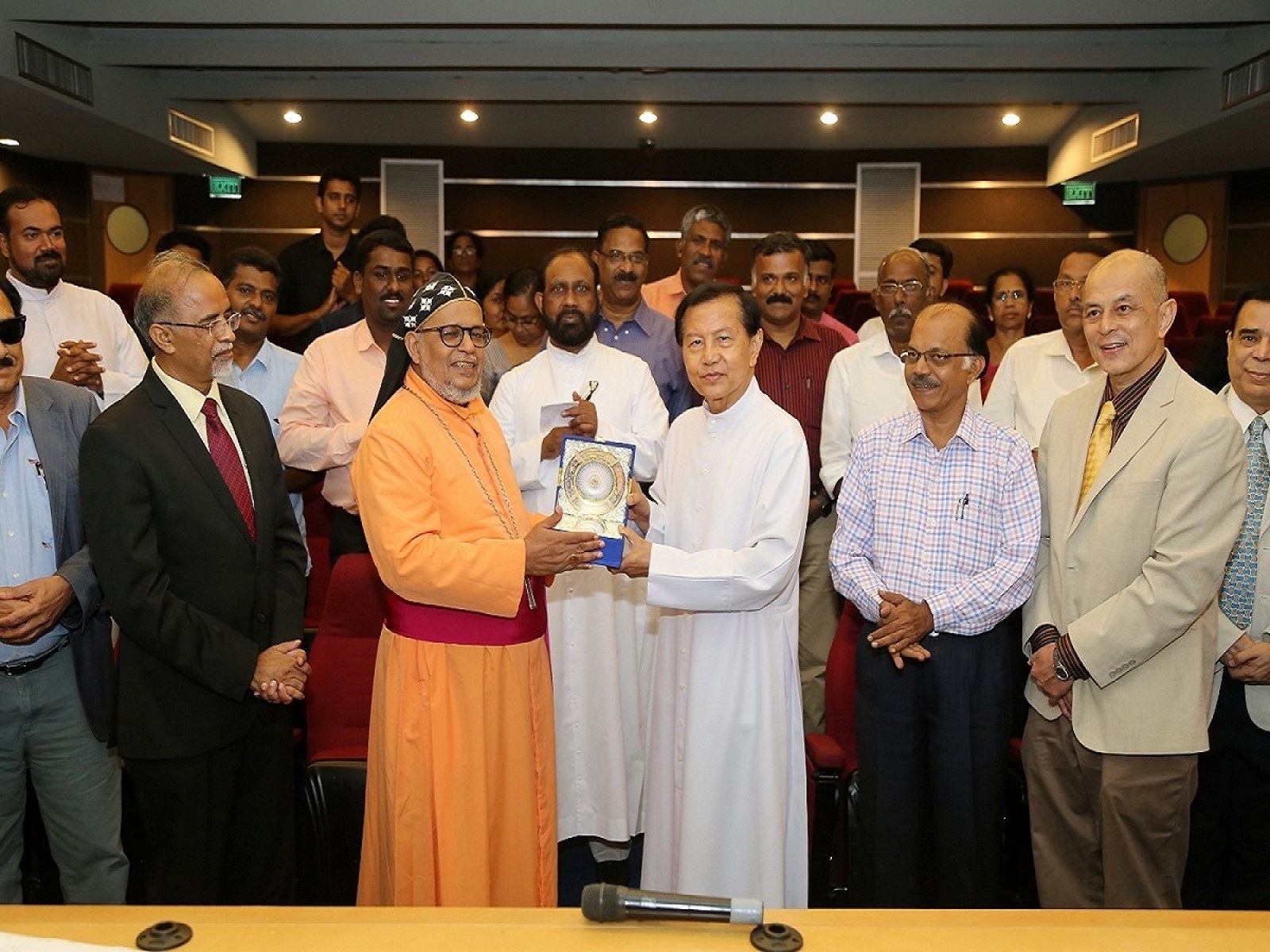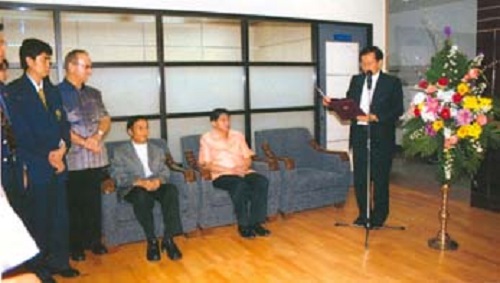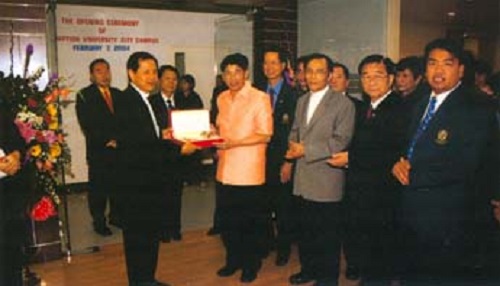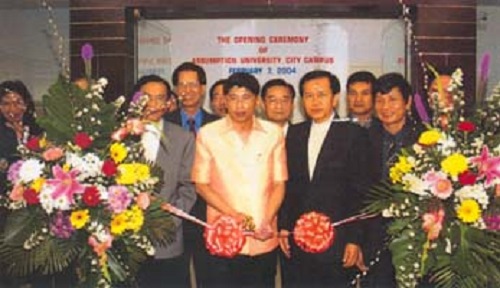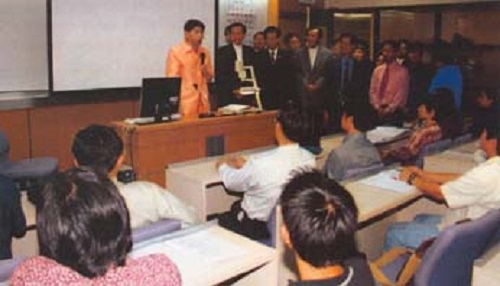Assumption University City Campus Launched.
Speech by President, Dr. Bancha Saenghiran
Your Excellency Prof. Dr.Wissanu Krea-Ngam, Deputy Prime Minister of the Royal Thai Government.
On behalf of Assumption University, I express my grateful thanks to you for giving your precious time to preside over the Opening Ceremony of our City Campus.
Assumption University is a higher education institution administered by the Brothers of St. Gabriel which exists to provide education, knowledge and training to develop human resources of the country. It started modestly in 1972 as an institution called Assumption Business Administration College or ABAC with English as the medium of instruction. The University has grown continuously until it is now recognized as the first International University of Thailand. We currently offer 41 Bachelor, 31 Master and 8 Doctorate Degree Programs with a total enrollment of approximately 20,000 including a component of some 2147 international students from 57 countries of the world. Accordingly we contribute more than 500 million baths annually to the revenues of Thailand and at the same time we save expenditure of several billion baths a year by preventing or restraining students from pursuing education at foreign institutions abroard.
Assumption University is now operating 2 campuses, one each at Hua Mak and Bang Na and performing 4 main missions of the higher education institutions: 1.providing training and instruction, 2.producing research, 3.offering knowledge service to the society and 4.supporting national art and culture.
President Dr. Bancha Saenghiran giving his speech at City Campus in the presence of
Deputy Prime Minister, President Emeritus and other guests.
Deputy Premier H.E. Prof. Dr. Wissanu Krea-Ngam accepting a souvenir from President Dr. Bancha Saenghiran.
In launching this new City Campus at the Emporium Tower, our purpose is to expand knowledge services to society and to enlarge educational opportunities according to the Educational Expansion Policies of Thailand. The City Campus has the following facilities: 50-sear seminar room, 56-seat classroom and_an 18 seal common room with modern teaching materials and equipments.
The first program that the new city campus provides is entitled Vietnam Studies, which is administered by the Institute of Asian and African Studies (IAAS), Assumption University. The objective of the course it to propagate knowledge and education about Vietnam including promotion of its language, traditions, culture, economics and society.
Now it is the auspicious time to invite H.E. the Deputy Prime Minister to preside over the Opening Ceremony of Assumption University City Campus and the Vietnam Studies Centre respectively.
It is with great honour that I preside at the opening of Assumption University City Campus today. I would like to express my sincere appreciation to the University for its strong determination to improve the quality of the human resources of the country, which is vital for the increasingly competitive world in this era of globalization.
Life-long learning is the key aspect of education reform with the main purpose of transforming Thai society into a society of intelligent and prosperous citizens. In order to achieve the goal, the collaboration among the education institutions is very essential. Specifically for higher education institutions, the emphasis should not only be on providing education and instruction to young people, but also on adapting themselves to be ‘Knowledge Centers for Open Learning’ which is beneficial to people of all ages. Therefore, higher education institutions must emphasize on the importance of building into continuing education centers, focusing on the training of business people, entrepreneurs, as well as laborers by setting up the mechanisms to explore the needs of all sectors. Overall, higher education institutions must function as the rallying point for pursuit of knowledge that everyone, regardless of gender, age or profession, can seek and search for so that Thai people can live their life most productively.
The establishment of the City Campus in the heart of downtown Bangkok truly reflects the wisdom of the administrators in seeking investment opportunities an the strong determination of the University to improve the quality of the country’s human resources. ‘Vietnam Studies’ at this campus will not only provide entrepreneurs or interested people with ideas and guidelines on investing in or having business with Vietnam but it will also help improve the economy of our country. In this regard I do hope that the University will consistently offer other useful courses so that Thai people will gain the ideas and concepts to operate business with other countries, which will boost the exports and bring in foreign currency for the economic stability of our country.
Prof. Dr. Wissanu Krea-Ngam cuts the ribbon at the opening ceremony of the
A.U. city Campus in the presence of administrators and guests.
Deputy Prime Minister speaking to students attending the Vietnam Studies Program on February 7, 2004.
Now I would like to take this opportunity to inaugurate Assumption University City Campus and to mark the opening of the ‘Vietnam Studies Centre’. May all endeavours of Assumption University City Campus be successful and prosperous and may you achieve the objectives of the Vietnam Studies Centre.
แหล่งที่มา : ABAC TODAY (Vol. 19 No. 1 January-February 2004) หน้า 15-16
สมเด็จพระเทพรัตนราชสุดาฯ สยามบรมราชกุมารี
เสด็จพระราชดำเนินทรงเปิดอาคาร
“ศรีศักดิ์ จามรมาน สถานเทคโนโลยีสารสนเทศ”
วันศุกร์ที่ 20 สิงหาคม 2547
คำกราบบังคมทูล โดย ภราดาบัญชา แสงหิรัญ อธิการบดีมหาวิทยาลัยอัสสัมชัญ 2547
ขอพระราชทานกราบบังคมทูล ทรงทราบฝ่าละอองพระบาท
ข้าพระพุทธเจ้า ภราดาบัญชา แสงหิรัญ อธิการบดีมหาวิทยาลัยอัสสัมชัญ ในนามของสภามหาวิทยาลัยคณาจารย์ เจ้าหน้าที่ นักศึกษา บรรดานักบวช ผู้ปกครองของนักศึกษา และผู้มีเกียรติที่ได้เฝ้าทูลละอองพระบาทอยู่ ณ สถานที่แห่งนี้ มีความซาบซึ้งและสำนึกในพระมหากรุณาธิคุณเป็นล้นพ้นที่ใต้ฝ่าละอองพระบาทเสด็จพระราชดำเนินมาทรงประกอบพิธีเปิดอาคารศรีศักดิ์ จามรมาน สถานเทคโนโลยีสารสนเทศ และพระราชทานเข็มที่ระลึกแก่ผู้มีอุปการะคุณต่อมหาวิทยาลัย ข้าพระพุทธเจ้า ขอพระราชทานพระวโรกาศ กราบบังคมทูลประวัติและความเป็นมาเกี่ยวกับ อาคารศรีศักดิ์ จามรมาน สถานเทคโนโลยีสารสนเทศ โดยสังเขปดังนี้
มหาวิทยาลัยอัสสัมชัญ เป็นสถาบันการศึกษาระดับอุดมศึกษาของมูลนิธิเซนต์คาเบรียลแห่งประเทศไทย ที่ได้ดำเนินการจัดการศึกษา เพื่อสนองความต้องการส่วนบุคคลและความต้องการของชาติในสาขาวิชาต่างๆอย่างหลากหลาย โดยเฉพาะได้บุกเบิกการพัฒนาบุคลากรทางด้านเทคโนโลยีสารสนเทศด้วยการเริ่มโครงการการจัดหลักสูตรทางด้านบริหารคอมพิวเตอร์ธุรกิจขึ้นในปี พ.ศ.2522 และต่อมาได้จัดสอนในหลักสูตรทางด้านเทคโนโลยีสารสนเทศเพิ่มขึ้นในระดับปริญญาตรี ปริญญาโท และปริญญาเอก จนอาจกล่าวได้ว่ามีหลักสูตรทางด้านเทคโนโลยีสารสนเทศมากที่สุดในประเทศไทย
สังคมโลกปัจจุบัน การผนวกข้อมูลข่าวสารโดยใช้เทคโนโลยีที่ทันสมัยในยุคโลกาภิวัฒน์ ทำให้เกิดการแข่งขันที่รุนแรงและถ้าหากประเทศไทยไม่สามารถจะก้าวให้ทันตามโลกที่เปลี่ยนไป เราก็จะไม่สามารถแข่งขันกับ ชาวโลกได้ โดยนัยนี้มหาวิทยาลัยเห็นว่าการพัฒนาทรัพยากรมนุษย์ให้เหมาะสมกับยุคแห่งการเรียนรู้จึงเป็นสิ่งที่จำเป็นและการอ่านออกเขียนได้ของคนในยุคนี้ก็คือการเรียนรู้ที่จะนำคอมพิวเตอร์มาใช้ในเรื่องต่างๆ ได้อย่างมี ประสิทธิภาพ
มหาวิทยาลัยอัสสัมชัญ โดยชื่อและสถานภาพของ “อัสสัมชัญ” มีความหมายเป็นที่ประจักษ์แก่คนทั่วไปว่าเป็น “ศูนย์รวมที่สถิตขององค์ความรู้” และเนื่องจากมหาวิทยาลัยได้เป็นผู้ร่วมก่อตั้งสมาคมอินเตอร์เน็ตแห่งภาคพื้นเอเชียด้วย จึงมีความเหมาะสมที่มหาวิทยาลัยอัสสัมชัญจะได้จัดสร้างศูนย์แห่งการเรียนรู้และเปิดโอกาสให้ คนทั่วไปทุกระดับชั้น ไม่ว่าจะเป็นเด็กอนุบาล คนหูหนวก คนตาบอด แม้กระทั่งคนชราที่ยังมีขีดความสามารถในการพิมพ์ ได้มีโอกาสมาฝึกการใช้คอมพิวเตอร์ในงานต่างๆ อันเป็นการสร้างสมรรถนะของคนในชาติทางด้านความรู้การใช้คอมพิวเตอร์ ที่อาคารศรีศักดิ์ จามรมาน สถานเทคโนโลยีสารสนเทศ
อาคารศรีศักดิ์ จามรมาน สถานเทคโนโลยีสารสนเทศ เริ่มก่อสร้างเมื่อวันที่ 29 เมษายน พ.ศ. 2545 เป็นอาคาร 10 ชั้น เนื้อที่ทั้งหมด 12,000 ตารางเมตร ค่าใช้จ่ายในการก่อสร้าง 185 ล้านบาท มหาวิทยาลัยได้ ตั้งชื่ออาคารนี้ว่า “ศรีศักดิ์ จามรมาน สถานเทคโนโลยีสารสนเทศ” เพื่อเป็นเกียรติแก่ศาสตราจารย์ ดร. ศรีศักดิ์ จามรมาน ที่เป็นผู้ริเริ่มวางรากฐานและพัฒนาหลักสูตรทางด้านคอมพิวเตอร์และเทคโนโลยีสารสนเทศในระดับปริญญาตรี ปริญญาโทและปริญญาเอก ที่มหาวิทยาลัยอัสสัมชัญตั้งแต่ปีพ.ศ.2522 โดยได้เปิดสอนในหลักสูตรบริหารธุรกิจบัณฑิต สาขาวิชาคอมพิวเตอร์ธุรกิจอันเป็นหลักสูตรแรกของประเทศไทยและได้พัฒนาขยายเพิ่มขึ้น อีกหลายหลักสูตรและหลายสาขาวิชาจนถึงระดับปริญญาเอก
อาคารศรีศักดิ์ จามรมาน สถานเทคโนโลยีสารสนเทศ จะสามารถรองรับการพัฒนาการเรียนการสอนทางด้านเทคโนโลยีสารสนเทศ ของมหาวิทยาลัยได้อย่างกว้างขวางทั้งในปัจจุบัน และในอนาคตจะเป็นศูนย์แห่งความเป็นเลิศด้านการศึกษาไอซีทีเป็นที่ตั้งของวิทยาลัยการศึกษาทางไกลอินเทอร์เน็ต และศูนย์คอมพิวเตอร์ของมหาวิทยาลัย
ด้วยสำนึกในพระมหากรุณาธิคุณของใต้ฝ่าละอองพระบาท ข้าพระพุทธเจ้าในนามของผู้บริหาร คณาจารย์และเจ้าหน้าที่ ขอตั้งสัตย์ปฏิญานต่อใต้ฝ่าละอองพระบาทในวันนี้ว่ามหาวิทยาลัยอัสสัมชัญจะพยายามทำหน้าที่ของสถาบันอุดมศึกษา เพื่อผลิตบุคลากรที่มีคุณภาพออกไปรับใช้ชาติเป็นแหล่งขององค์ความรู้ที่เปิดโอกาสให้บุคคลทั่วไปได้มีโอกาสพัฒนาตนเองทางด้านเทคโนโลยีสารสนเทศเพื่อเป็นรากฐานและกำลังสำคัญในการพัฒนาชาติต่อไป
ด้วยเกล้าด้วยกระหม่อม
Presidential Address
Rev. Bro. Dr.Bancha Saenghiran f.s.g.
President, Assumption University
Honored guests, aistinguished participants, faculty and students:
First and foremost, let me welcome all of you to Assumption University and to this seminar in particular.
In the long history, mankind has always been trying to find peace. Yet, peace seems to be elusiye, defying all our efforts to achieve it. According to historical records, wars usually take the form of a series of military campaigns between two opposing sides involving a dispute over sovereignty, territory, resources, religion, or ideology, amongst other issues. Wars seem as old as human society, and they certainly featured prominently in our recorded history. Many tribal societies engage in internecine strife. and warfare and it is typical for such groups to maintain warrior castes or militias.
Technology has played a role in the evolution of warfare. Inventions contribute to advances in different fields, but modern technology has greatly increased the potential cost and destructiveness of war.
Though at present there is no open or declared war, yet you can see eruptions and outbreaks or hostilities, such as bombings, shootings and other forms of violence in many parts of the world. The instances of belligerence, terrorism, of killings and shootings are too many and too widespread to be cited here. But the uprising in the southern part of Thailand , in provinces such as Pattani, Yala. Narathiwat is much closer to horne and the need to restore peace and harmony to the wartorn areas is an urgent necessily.
Causes of War
If we include conflicts in the delinition of war then disruptions of peace can be observed in many parts of the world. Causes vary depending on location, parties involved and other circumstances. The parties either perceive immediate threat to sovereignty or they may have differences or grievances, an immediate need for essential provisions for survival (such as food, water, and other resources) or a long standing hatred between nations that has built up over a number of years. Religious disputes and ideological differences can also cause wars. We have also seen wars caused by some nations pursuing policies of global domination.
In the modern items we have seen wars launched in pursuit of new markets, of natural resources, and of wealth. In many cases wars serve the interests of the wealthy, the feudal lords or the nobility. Some social activists argue that materialism is the supreme cause of war. According to Malthusian theory, wars are caused by expanding populations and limited resources.
Whatever should be the causes of war, the effects of war are unprecedented casualties and destruction across the theatres of conflict. When asked what kind of weapons would be used to fight World War III, the physicist Albert Einstein replied:
"I know not with what weapons World War III will be fought, but World War IV will be fought with sticks and stones."
Peace is commonly understood to mean the "absence of hostilities". Other definitions include freedom from disputes, harmonious relation and the absence of mental stress or anxiety, as the meaning of the word changes with context. However, there are others who would say that the absence of hostilities would refer to only those hostilities which are evident and that true peace only derives from the mind of each individual. A person's conception of "peace" is often the product of culture and upbringing. Based on realization that independence, freedom and justice is inherent to all nations, peace can be achieved when a nation fulfills its duty to choose, live and respect others.Many believe that peace is more than the absence of certain social maladies. From this perspective, peace requires not only the absence of violence but also the presence of justice, as articulated by world lenders like Mahatma Gandhi and others. Much more broad visions of peace than a mere "absence of war" or even a "presence of justice" require to be framed. Peace does not necessarily have to be something the humans might achieve "some day". Peace must be made an essential condition for humanity- - so that we can create and expand it in small ways in our everyday lives.
Since January 2004 the smoldering Malay Muslim insurgency in southern part of Thailand in the provinces of Pattani, Yala and Narathiwat has surfaced again resulting until now in the deaths of more than 1,300 people. The insurgency which was dormant since 1980's has come back threatening the peaceful development of Thailand as a multi-ethnic and multi-religious nation.
The emergence of insurgency in southern part of Thailand has become a soul searching situation for the Thai nation requiring us to find ways and means to bring about a peaceful resolution to the crisis, to rebuild friendly relations between the different ethnic and religious sections of the country and continue on the path of building civil society in Thailand
The Thai state has embarked on finding solution to the crisis in a multi-pronged manner undertaking political, security, cultural and religious initiatives hoping to bring back peace and harmony to the restive South soonest.
This unrest in southern part of Thailand has also attracted international attention from a variety of nations and groups who are anxiously watching the situation with a serious concern to see if it will escalate into a larger conflict.
The main problems facing Thailand today is how to bring about peace through national reconciliation which, recognizes the multi-cultural and multi-ethnic character of Thai polity at the national level. The recent report of the National Reconciliation Council led by the former Prime Minister Mr. Anand Panyarachun has made valuable recommendation which, if implemented seriously, will aid in building peace in the southern part of the country.
The main objective of this seminar is to offer a forum for Thai and international academicians and public figures to explain and discuss the historical background and the causes behind the unrest in southern part of Thailand and to offer suggestions about hom to build peace in that region.
The urgent concern for alll of us now is to find ways and means, and solutions to the conflict in the three southern provinces of Thailand.
How best to resolve the conflicts? This is the reason why we are assembled here today. We have to make methodical enquiries, engage in dialogue and discussions and search for solution to the problem. Unless the root cause of the problem can be identified, peace will never be achieved.
Dear Participants:
Before we go ahead with finding peace for others, each one of us must find an inner peace. .It is a state of mind, body and soul, which is said to take place within ourselves. The feeding is not dependent on time, people, place, or any external object or situation. If each one of us here has an inner peace, then a chain reaction for both inner peace and world peace may be established and the conflicts in the South can see the light at the end of the tunnel.
On this occasion, let me thank the initiatives of the Konrad Adenauer Foundation and their generosity in sponsoring this seminar.
I sincerely hopc that this seminar will contribute significantly toward regaining mutual trust among the people of southern part of Thailand and that peace and harmony will soon return to the region.
May I welcome you all once again to the seminar. Wish you success in your discussion and deliberations.
May God Bless you with inner peace!


